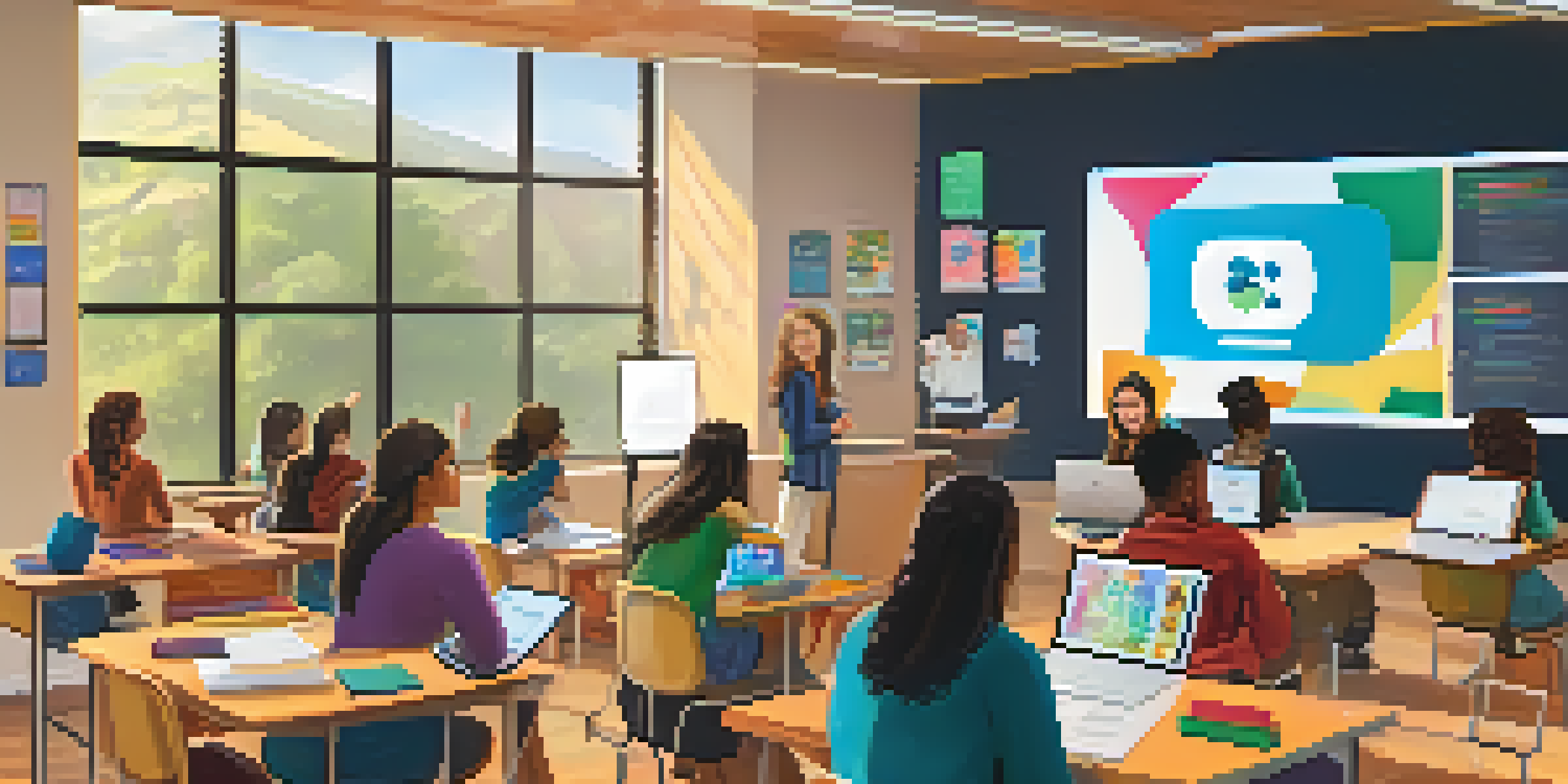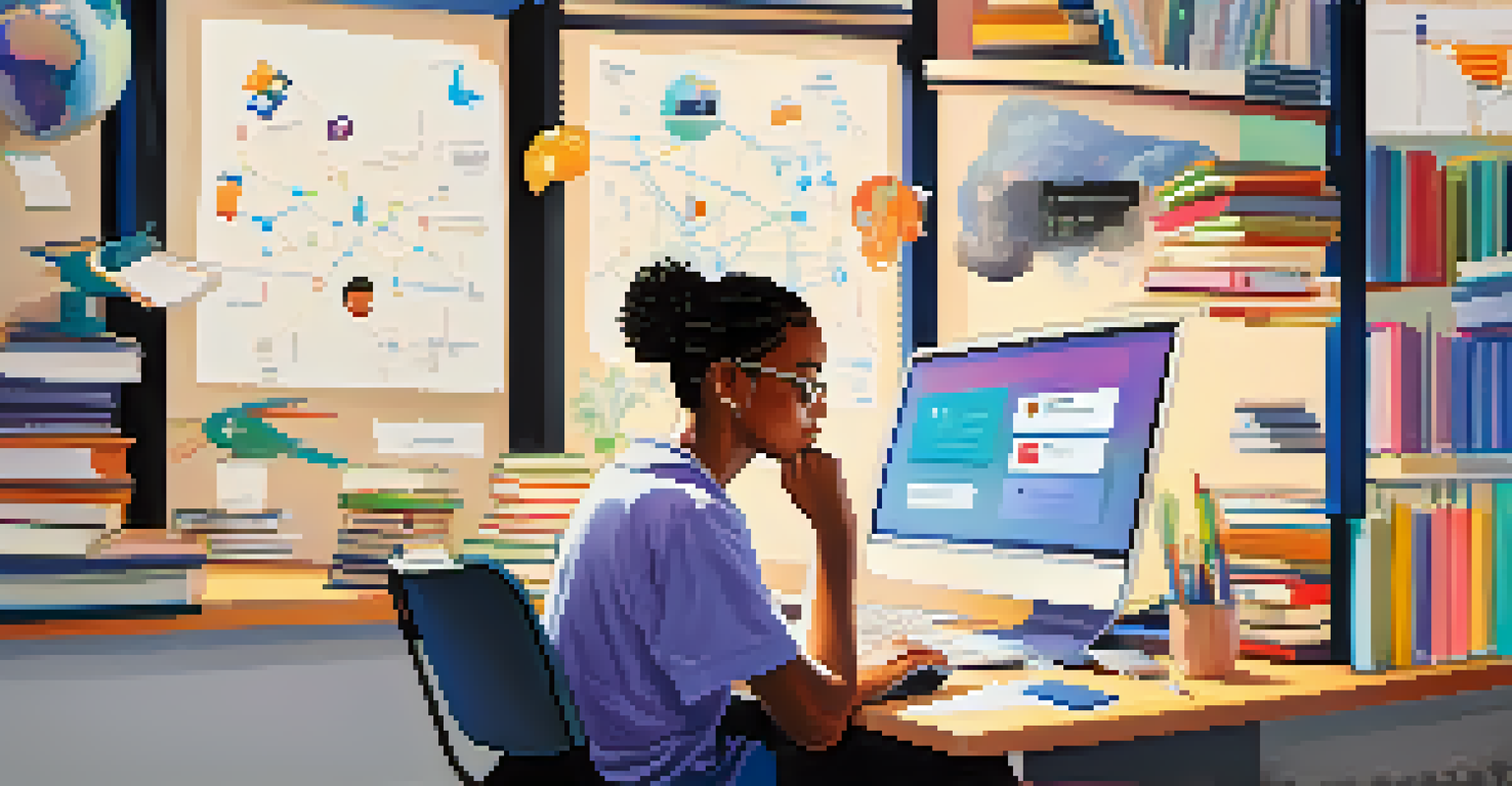The Effects of Social Media on Online Learning Engagement

Understanding Online Learning Engagement in the Digital Age
Online learning engagement refers to how actively students participate and interact in a virtual learning environment. It plays a crucial role in academic success, as engaged learners are more likely to absorb information and retain knowledge. In this digital age, social media has emerged as a powerful tool that can either enhance or hinder this engagement.
The greatest danger in times of turbulence is not the turbulence; it is to act with yesterday's logic.
With platforms like Facebook, Twitter, and Instagram, students have new avenues to communicate and collaborate. These platforms can foster a sense of community and belonging that might be lacking in traditional online settings. However, they can also become distractions that pull attention away from learning tasks, creating a double-edged sword for educators.
Understanding the balance between leveraging social media for engagement and managing its potential distractions is essential. By recognizing these dynamics, educators can better design their online courses to harness the positive aspects of social media while minimizing its drawbacks.
The Role of Social Media in Fostering Connections
Social media platforms allow students to connect with their peers, instructors, and even industry professionals, creating a rich network of support. This connectivity can enhance motivation and accountability, as students feel more invested in their learning when they share it with others. For example, study groups can form organically through social media, leading to collaborative learning experiences.

Furthermore, these connections can extend beyond mere social interactions; they can also facilitate the exchange of ideas and resources. Students can share articles, videos, and other materials that complement their coursework, enriching their learning experience. This sharing culture can turn social media into a valuable educational resource.
Social Media Enhances Learning
Social media platforms foster connections among students, enhancing motivation and collaborative learning experiences.
However, it is essential to navigate these connections thoughtfully. While fostering a supportive online community is beneficial, students must also be encouraged to manage their time effectively to avoid falling into the trap of endless scrolling and distractions.
Enhancing Learning through Collaborative Platforms
Social media can serve as a platform for collaborative learning, where students work together on projects, share insights, and provide feedback. Tools like Google Docs or discussion threads on platforms like Slack or Discord can enhance communication and streamline group work. This collaborative approach mimics real-world scenarios where teamwork is vital, preparing students for future careers.
Technology will not replace teachers, but teachers who use technology will replace those who don't.
When students engage in collaborative projects through social media, they can benefit from diverse perspectives and ideas. This diversity can lead to richer discussions and more innovative solutions to problems. It cultivates a sense of shared responsibility for learning outcomes, which can be particularly motivating.
However, it’s crucial to set clear guidelines and expectations for collaboration. Educators should provide structure to these group activities to ensure that all participants contribute meaningfully and stay focused on their academic goals.
The Influence of Social Media on Motivation Levels
Motivation is a key component of online learning engagement, and social media can play a significant role in influencing it. Positive interactions and encouragement from peers can boost a student's motivation to succeed in their studies. For instance, receiving likes and supportive comments on a post about academic achievements can create a sense of accomplishment.
Conversely, social media can also lead to feelings of inadequacy or comparison among students. When they see others showcasing their successes, it might create pressure and anxiety, negatively impacting their motivation. This phenomenon often referred to as 'social comparison,' can be detrimental to the learning experience.
Navigating Distractions is Crucial
While social media can boost engagement, it also poses distractions that students must manage to maintain focus on their studies.
To harness the motivational benefits of social media, it's essential for educators to promote a culture of positivity and support. Encouraging students to celebrate each other's achievements can create a more inclusive and motivating learning environment.
Navigating Distractions: The Dark Side of Social Media
While social media offers numerous benefits for online learning engagement, it also poses significant distractions. Notifications, trending topics, and endless scrolling can divert students' attention away from their studies. This can lead to decreased focus and, ultimately, lower academic performance.
Finding ways to minimize these distractions is crucial for maintaining engagement. Simple strategies, such as setting specific study times or using apps that block social media during study hours, can help students stay on track. Educators can also provide guidance on effective time management techniques to help students balance their social media use with their learning goals.
Ultimately, it’s about teaching students to be mindful of their social media habits. By fostering self-regulation, educators can help students enjoy the benefits of social media while avoiding its pitfalls.
Social Media as a Tool for Feedback and Assessment
Feedback is vital in the learning process, and social media can facilitate timely and constructive feedback between students and instructors. Through platforms like Twitter or Facebook groups, instructors can quickly address questions or concerns, fostering an ongoing dialogue about course content. This immediate feedback loop can significantly enhance the learning experience.
Moreover, students can use social media to provide peer feedback, which can be a powerful learning tool. By critiquing each other's work, they not only help their peers improve but also deepen their understanding of the material. This collaborative feedback process encourages critical thinking and active engagement.
Feedback and Assessment via Social Media
Social media facilitates timely feedback between students and instructors, enhancing the learning process through active engagement.
However, it's essential to establish norms around feedback to ensure that it remains constructive and respectful. Educators should provide guidelines on how to give and receive feedback effectively, creating a positive atmosphere for learning.
The Future of Social Media in Online Learning Environments
As technology continues to evolve, so too will the role of social media in online learning. Emerging platforms and tools are likely to reshape how students and educators interact, making learning even more dynamic and engaging. For instance, platforms incorporating virtual reality or gamification elements could change the landscape of online education.
The challenge will be to integrate these tools effectively without overwhelming students. Educators will need to remain adaptable and open to experimenting with new approaches while maintaining a focus on learning outcomes. Continuous professional development will be essential for teachers to harness the full potential of social media in their teaching.

As we move forward, the collaboration between educators, students, and social media platforms will be critical. By embracing innovation while prioritizing educational goals, we can create a more engaging and effective online learning experience for everyone.